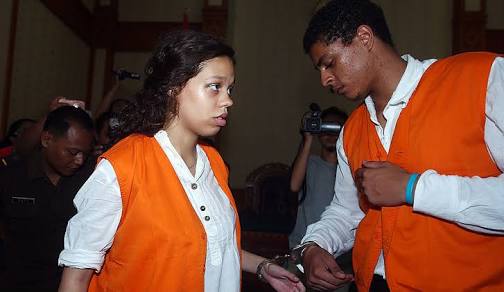Tommy Schaefer is black and proud, and angry and loud, and he wants the world to know it.
He fancies himself as the victim of some terrible miscarriage of justice, doing time for a crime he didn’t commit.
“Black lives matter,” he’s fond of saying to anyone who’ll listen, painting himself as yet another victim of a conspiracy that oppresses young African-Americans.
He acts tough, walking with a ghetto swagger picked up on the streets of his hometown, Chicago. He talks tough, peppering his conversation with “muthafucker”, “bitch”, and “pigs”, copied from the rap music he constantly listens to. And he dresses tough, favoring Bulls basketball gear or ghetto pants that slide down his rear, revealing preppy Tommy Hillfiger underwear.
In reality, he’s a frightened, bewildered man-child, out of his depth in an Indonesian prison after committing one of the most inept murders in the island’s history.
Schaefer, now 23, and his then-girlfriend Heather Mack, now 21, were convicted in 2015 of murdering Heather’s mother Sheila at the five-star St Regis hotel in Nusa Dua.
Heather and her millionaire mother had a tempestuous relationship — police had been called to their home dozens of times — and had come to Bali in in August 2014 in a bid to repair it.
Heather had long been a wild child, hanging out with the wrong crowd despite her privileged upbringing. Her father James, a renowned musician, had died about a decade earlier.
A week into the holiday, Heather told her mother she was pregnant — and then shocked her even more by revealing the father, Tommy, was also in Bali, courtesy of a ticket bought using Sheila’s credit card.
 Sheila was outraged and told Heather she would be cut off from her inheritance.
Sheila was outraged and told Heather she would be cut off from her inheritance.
Details of the murder and court case are easy to find on the Internet, but in short Tommy beat Sheila to death with a fruit bowl before the pair stuffed the body into a large suitcase.
They planned to go to the airport and leave the suitcase there while buying tickets to somewhere else in the world, but hotel staff wouldn’t allow them to retrieve their passports and money from a safety deposit box in Sheila’s name.
Panicking, they fled across the island, leaving the suitcase — by now leaking blood — in the back of a taxi.
They were arrested the next day in bed at a cheap hotel, and concocted a story about a gang that had kidnapped them. CCTV hotel footage and voluminous text messages showed the pair had been planning — if you could call it that — the murder for weeks, and had also conscripted Tommy’s cousin in Chicago to ask for advice.
Tommy was sentenced to 18 years in jail, Heather to 10. The cousin, Robert Bibbs, pleaded guilty in a trial in Chicago and in a deal with prosecutors will be sentenced later this month to a maximum 20 years, but eligible for parole after five.
 Tommy attached himself to me quite soon after my arrival, and I was struck by just how unworldly he was. He wore his race on his sleeve, but seemed genuinely bewildered that the Nigerians and Ugandans seemed to treat me and the white South Africans with more respect, and laughed when he called them brother.
Tommy attached himself to me quite soon after my arrival, and I was struck by just how unworldly he was. He wore his race on his sleeve, but seemed genuinely bewildered that the Nigerians and Ugandans seemed to treat me and the white South Africans with more respect, and laughed when he called them brother.
He was hard work.
I lent him an anthology of modern American poetry after discovering he’d never heard of James Baldwin or Maya Angelou, but when I asked for his views a couple of days later he sheepishly admitted he had lost the book.
I spent a couple of hours — I have to say I enjoyed the challenge — giving him a lecture on slavery in general and the history of Liberia in particular, and the next day he couldn’t recall the name of the country.
He concocted wild conspiracy theories about how people in Kerobokan were out to get him, becoming very agitated from all the drugs he was taking and then threatening to fight anyone who tried to calm him down.
He was hopeless at fighting, however, and always ended up on the losing side.
In the first month I was in Kerobokan, there was a scuffle in our block almost every day, and it invariably involved Tommy. People genuinely tried to help him, but he was impervious to it.
At night he’d spend hours talking via WhatsApp to a stable of girlfriends in America — I’ve discovered a ghoulish sub culture of women who seem to get off on “dating” notorious murderers.
And he didn’t seem to want for money. He’d be visited daily by earnest missionaries from U.S. Christian groups who’d bring him anything he asked for, which he’d trade for drugs.
In February Tommy uploaded a series of video confessions by Heather to YouTube in which she absolved him of any role in the murder, saying she had acted alone. The U.S. media went to town on it, noting their access to telephones and the Internet, and the local press soon started asking questions of prison authorities.
Since breaking up with Heather after the birth of their daughter, Tommy has taken to social media several times to vent about his imprisonment and the “tough” conditions we’re kept under — each time embarrassing the authorities.
 Their daughter lived in Kerobokan until April 1, when she was given over in custody to a local family. Sheila’s family want her returned to the United States and a bitter legal battle is being played out in court in Chicago, with Heather still apparently heir to a fortune that could go directly to her child.
Their daughter lived in Kerobokan until April 1, when she was given over in custody to a local family. Sheila’s family want her returned to the United States and a bitter legal battle is being played out in court in Chicago, with Heather still apparently heir to a fortune that could go directly to her child.
After the YouTube incident, authorities told us that unless Tommy gave up his phone, they would come down hard on the entire block and we could expect daily raids from then on. We gave him until the next morning to hand it over, and that night he spent two hours in my cell, crying, insisting he had thrown it over the wall. I didn’t believe him.
The next day about six of the senior inmates jumped him and gave him a fairly solid beating before dumping him at Cell Tikus, the rat cell. We found his phone hidden in the ceiling of his cell.
He spent a week in solitary and has since been moved to an Indonesian block where, apparently, he is slowly getting on everyone’s nerves.
There are four or five prisoners like Tommy in Block B — although none quite as disruptive. They’ll go a week or two behaving normally, but will then start doing things that threaten fellow inmates or the entire block, and this has to be dealt with.
It’s usually drug related, but it is also obvious that many of my fellow prisoners are suffering from depression or even more serious mental illness, and they have no chance of getting any proper care in here.
All you can do is try to contain them.
Every piece is surprising and illuminating about a place I didn’t know existed. These are fascinating stories properly told. You are doing good work here Mr. Fox.
someone worse than joe is in there???
Well done Fox! I am reading your blogs every time; life in Kerobokan must be tough! Just a few more weeks……
Superb piece of writing as always
Cannot wait to read these reports in a book. Also make a great movie or TV series. Cousin Ann
“…giving him a lecture on slavery in general and the history of Liberia in particular, and the next day he couldn’t recall the name of the country.”
Nothing in the world is as depressing as such an encounter.